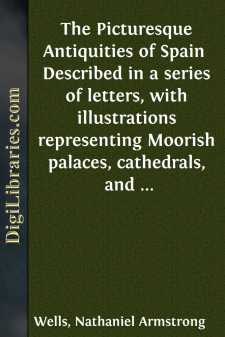Categories
- Antiques & Collectibles 13
- Architecture 36
- Art 48
- Bibles 22
- Biography & Autobiography 813
- Body, Mind & Spirit 142
- Business & Economics 28
- Children's Books 17
- Children's Fiction 14
- Computers 4
- Cooking 94
- Crafts & Hobbies 4
- Drama 346
- Education 46
- Family & Relationships 57
- Fiction 11829
- Games 19
- Gardening 17
- Health & Fitness 34
- History 1377
- House & Home 1
- Humor 147
- Juvenile Fiction 1873
- Juvenile Nonfiction 202
- Language Arts & Disciplines 88
- Law 16
- Literary Collections 686
- Literary Criticism 179
- Mathematics 13
- Medical 41
- Music 40
- Nature 179
- Non-Classifiable 1768
- Performing Arts 7
- Periodicals 1453
- Philosophy 64
- Photography 2
- Poetry 896
- Political Science 203
- Psychology 42
- Reference 154
- Religion 513
- Science 126
- Self-Help 84
- Social Science 81
- Sports & Recreation 34
- Study Aids 3
- Technology & Engineering 59
- Transportation 23
- Travel 463
- True Crime 29
The Picturesque Antiquities of Spain Described in a series of letters, with illustrations representing Moorish palaces, cathedrals, and other monuments of art, contained in the cities of Burgos, Valladolid, Toledo, and Seville.
Description:
Excerpt
LETTER I.
TO MRS. C—— R.
Rue de Richelieu.
You perceived at a glance the satisfaction you caused me, when, on receiving my temporary adieus, you requested me to send you some account of my travels in Spain. Had it not been so, you had not been in possession, on that day, of your usual penetration. Indeed, you no doubt foresaw it; aware that, next to the pleasure of acquiring ocular information respecting the peculiar objects which interest an individual, there is no greater one than that of communicating to a spirit, animated by congenial tastes, the results of his explorations. You must have foreseen, that, with my recollections of the pleasure I had derived from our excursions in one of the most interesting regions of France, during which I was witness to the intelligence and rapidity of perception you displayed in the appreciation of the monuments of the Middle Ages, the opportunity of committing to paper the impressions I should receive in a country so rich in those treasures, with a view to your information, would give an additional interest to my tour, as well as encouragement in surmounting the obstacles to be met with among a people not yet broken in to the curiosity of tourists.
You professed also, with a modesty always becoming to talent and worth, a complete ignorance respecting Spain: adding, that you would be grateful for every sort of information; and that you were anxious to be enlightened on the subject not only of the monuments and fine arts, but also of the history of that country, of which you had never had an opportunity of informing yourself; summing up by the enumeration of the three names of the Cid, Charles the Fifth, and Roderic the Goth, the entire amount of your acquaintance with the leading characters of Spanish history.
Indeed, the ignorance you profess with some exaggeration, is more or less general in our country; nor is it surprising that such should be the case. Spain has been in modern times in the background of European progress. The thousand inconveniences of its routes and inns have deterred the most enterprising from making it a place of resort; and while a hundred less interesting scenes of travel, such as Baden-Baden, Bohemia, sporting adventures in Norway, or winterings in St. Petersburg, have claimed your attention during the reposes of quadrilles, and substantiated the conversation of several of your morning visitors, Spain has been unnoticed and unknown—laid on the shelf with the Arabian Nights—considered a sort of fabulous country, which it would be charming to know, but with which there would never be a chance of forming an acquaintance; and you have contented yourself with a sort of general information respecting it, derived from a few romances and poems. You are intimate with Boabdil and the wars of Granada, but to those events is limited your knowledge of its ancient history; and the reigns of Charles the Fifth and Philip the Second, with the addition of some confused visions, in which autos-da-fé and dungeons contrast in a rather gloomy background with laughing majas, whirling their castagnettes to the soft cadences of guitars, fill up the remaining space allotted to Spain in your recollections.
It would be a task full of interest for me—possessed, as I shall probably be, of ample opportunities for its accomplishment—to draw up for your information a summary of the leading events of Spanish history; connecting them by the chain of reigns of the successive sovereigns; and thus to press into a limited compass a sort of abstract of the annals of this extraordinary nation: but I am deterred by the certainty that such an attempt, by me, would fail of its intended object. The events, thus slurred over, would have the effect of whetting the appetite for knowledge, which they would not satisfy; and the interminable lists of monarchs, of successions, usurpations, alliances and intermarriages, rendered doubly intricate by the continual recurrence of the same names, without sufficient details to particularise each—a chaos of outlines without the necessary shading to bring out the figures from the canvass—would not only set at defiance the clearest memory, but would be a trial which I would not for worlds impose upon your patience....


